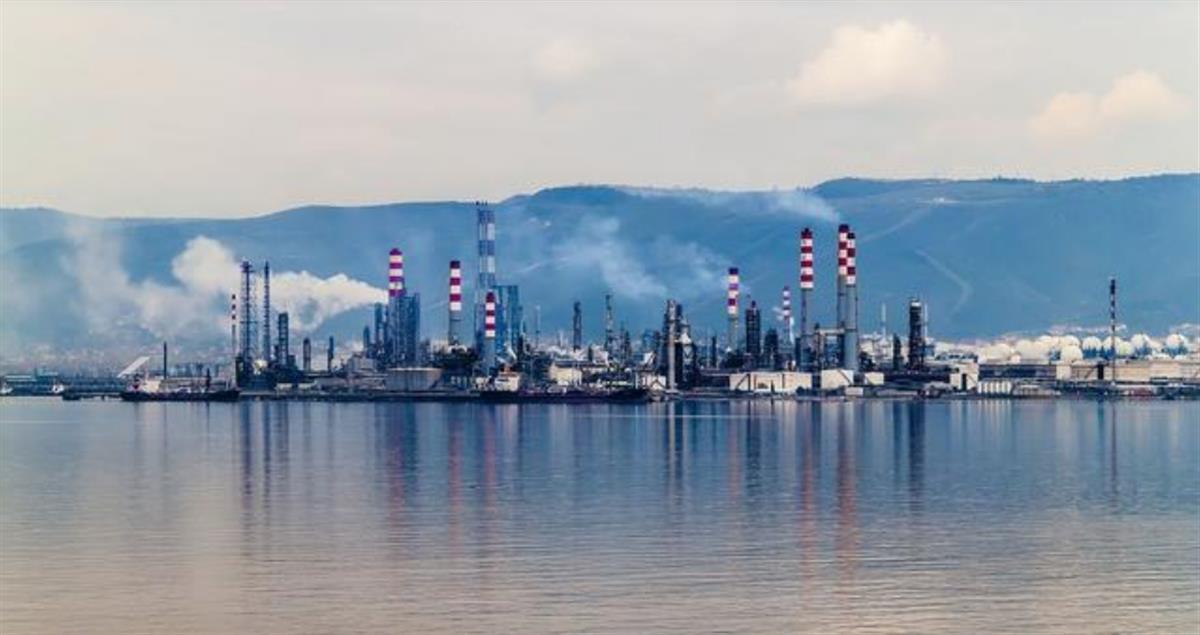
An oil refinery plant. (Credit: Pixabay)
Climate | #Sustainable business | News
by Michelle Langrand
As the Cop26 hype begins to settle down, the glass half-full or half-empty analysis on the outcomes of the Glasgow climate conference continues to pour out. But while government negotiators were entrenched in meeting rooms until late hours at night in the first two weeks of November, business actors did not just sit back and watch.
The World Business Council for Sustainable Development (WBCSD), which groups 200 CEOs of some of the world’s largest companies, launched on the margins of the climate talks calls for a framework to monitor companies’ climate commitments. The initiative has been dubbed Corporate Determined Contributions (CDCs), in the image of the Nationally Determined Contributions (NDCs), which refer to the climate plans that governments are required to submit under the Paris agreement.
The NDCs were one of the main topics of conversation in Glasgow as many countries failed to present their already overdue plans to bring down their carbon emissions.
“The reality is that 70 per cent of the emissions that are captured in NDCs come from business. We concluded that there is no mechanism today to know whether or not that 70 per cent is being reduced fast enough,” WBCSD president Peter Bakker told Geneva Solutions.
Many companies report on their greenhouse gas emissions, however, the lack of universal standards and monitoring has given way to a lot of poor accounting, namely around indirect emissions across the value chain, and greenwashing by some enterprises that want to send an image of caring for the environment without actually putting in place measures to reduce their carbon footprint.
“We're proposing a Corporate Determined Contributions system that will measure a company's commitments and whether they're good enough for the company to get to net zero by 2050 and halving emissions by 2030. And as we move through the years, we'll hold companies accountable on whether they actually deliver and make the progress that their plans had set out to do,” said Bakker.
No benefit of the doubt
Industries are often subject to scepticism from climate advocates, and reports of over 500 fossil fuel lobbyists flooding Cop26 only sparked further criticism. WBCSD has some of the world’s biggest polluters in its midst including fossil fuel giants Sinopec Group, Chevron and BP.
“Some of these companies are amongst the highest emitting companies in the world, but the pressure on them and responsibility for them to make these changes is massive,” noted Bakker.
How they enact that change is still up for debate. A large part of the high-emitting industries are betting on controversial measures to slash their emissions, such as carbon capture and carbon offsetting, which opponents say will only slow down the transition towards a green economy.
“Carbon capture is a technology that needs to be developed and if you can do it in a safe, secure way, at a cost-effective level then it is part of the mix of solutions. Offsetting needs to be either high-quality projects that are truly sequestering carbon as part of natural climate solutions, but cannot be an excuse to not reduce emissions,” he said.
“The big debate is on real emissions reduction. That's where the CDCs will come in. And we need to get the language that will measure that.”
Another issue that will determine the credibility of the proposed framework is whether it is on a voluntary basis. “The long-term solution has to be mandatory reporting,” said Bakker.
But getting companies behind the idea might prove hard. “What you need is leading companies and leading financial players to show that the transitions can happen. Then the regulator can say, ‘this is a system that works, there's plenty of companies already doing it and money is flowing their way. Now, it’s the rule.”
Building momentum
Next week in Geneva, Building Bridges will be an opportunity for the sustainable finance actors to try and rally momentum within a sector that is struggling to move away from supporting polluting and high-emitting activities.
“I think that's an interesting opportunity to have a real conversation on sustainable finance – not on what we're going to do or why we're going to do it but on how we’re going to do it,” said Bakker, who will be advising the financing event.
Bakker is hoping that the WBCSD’s initiative latches on to private-led efforts which are already in motion, specifically the setting up of the International Sustainability Standards Board (ISSB) launched by the US-based International Financial Reporting Standards Foundation (IFRS) in Glasgow on 2 November.
The ISSB, which will be headquartered in Frankfurt, will be tasked with drafting the rules on company reporting on environmental, social and governance matters – another area where the lack of clear rules and standards has attracted harsh criticism. The board has said it will have the accounting rules ready for the second quarter of 2022 and ready to be used for the 2023 reporting cycle.
“If this becomes the mandatory framework that companies use and we can help build it into this corporate determined contribution system, then every business will have to report their emissions and we can hold people accountable for whether they reduce or not,” said Bakker.
He imagines that the ISSB and the IFRS Foundation, along with the UN Framework Convention on Climate Change (UNFCCC), could be the ones to monitor the private sector’s climate pledges.
“Then it's not just the CEO that decides whether to come to the Cop or not,” he said.“We can say ‘you don't need to come to the Cop. We'll read your results and will tell you what we think’.”
SOURCE: GENEVA SOLUTIONS